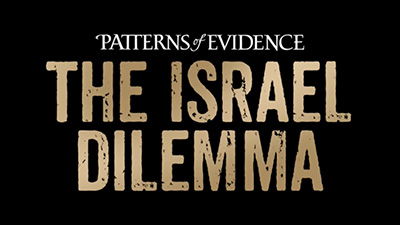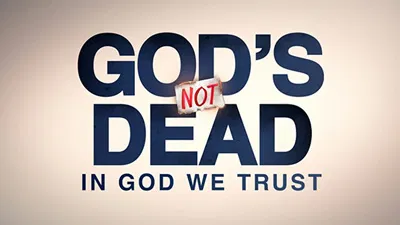God’s Not Dead Movie Review
This movie presents a conflict of worldviews on a college campus as a group of students sit as judge and jury over the omnipotent Creator God of the universe.
[Spoiler Alert: This short review reveals certain elements of the plot but only to the extent necessary to convey the concerns with the film.]
“We’re going to put God on trial!”
A film set for release in late March 2014 has been receiving a lot of attention in Christian media. God’s Not Dead weaves the stories of several students on a college campus, an outspoken professor, a local pastor, and several other characters together into a very interesting film.1 The storyline is one of conflict on a college campus where worldviews collide from multiple angles.
The trailer for the film features Professor Radisson challenging his philosophy students to acknowledge that God is dead by writing those three little words on a piece of paper. Josh Wheaton refuses to deny God in front of his peers and finds himself challenged to defend his belief in God in a series of debates with Professor Radisson in front of the class. The class gets to serve as judge and jury. As Wheaton considers his strategy, he comes to the conclusion that he must battle on an academic level with his professor in order to win the argument in his classmates’ eyes. Josh believes God wants to be defended before this group of college freshmen.
In the first debate, Wheaton boldly declares to his classmates, “We’re going to put God on trial!”
Think about that for a moment. A college freshman is going to place a group of teenagers who are willing to sign away their souls to please a philosophy professor they don’t even know as judge and jury over the omnipotent Creator God of the universe.
While Wheaton sought counsel from a pastor on his decision, he might have done well to consult his Lord who plainly said when He was tempted in the wilderness, “You shall not put the Lord your God to the test” (Luke 4:12, ESV). Only a fool thinks he can sit as judge over the Judge of the universe.
In approaching the issue in this manner, Wheaton ignores the truth of Romans 1:18–32. The people sitting in those seats and even the professor know God exists. The existence of God is not the question—whether they are willing to bow to Him as King is.
Wheaton could have agreed to the debate and used the Word of God as his foundation, as Jesus did in the wilderness temptation, but he chose to appeal to reason—the reason of fallen men and women whose minds are blinded by the god of this age (2 Corinthians 4:1–6). What’s more, as the debates play out, Wheaton uses a quote from Lee Strobel about the evolution of living things through the ages and a quote from the Roman Catholic astronomer Georges Lemaitre describing how the big bang corresponds to “let there be light” in Genesis 1:3 as his evidence for God’s existence. Rather than looking to God’s Word and character, the ideas of men developed a relatively short time ago form the basis for the case for God’s existence. Man’s words were elevated above God’s Word.2
In the climax, an emotional appeal draws out Radisson’s failure to accept God allowing evil in the world to reveal what Paul already told us—Radisson knew God existed, he just hated God and refused to acknowledge Him as Creator. He didn’t have an intellectual blindness; he had a spiritual and moral blindness.
While many Christians are excited to promote a movie that is well-made, tells a compelling story, and has the potential to spark conversations about God in our post-modern culture, some do so undiscerningly. In some instances, they may be unaware of the fact that this movie uses the big bang and the alleged evidence for the evolution of life on earth as major “proofs” of God’s existence. In other instances, the Christians endorsing the movie are happy to accept the big bang and biological evolution as proof of God’s work in the universe. In fact, the number of Christians insisting on that explanation is growing rapidly, and this film may serve to cause an inflation in those numbers. Regardless, this movie may cause people to think about God, but it will lead them away from the foundational truths of Genesis because of its unbiblical foundation. If this movie tells its viewers that they can’t trust Genesis as straightforward and foundational history, why then would they trust the rest of the Bible—including their need for a Savior—built on that shaky foundation?
Spread throughout the film were examples of very unbiblical counsel from Christian characters, sprinklings of secular psychology, and a failure to ever acknowledge sin as rebellion against God. Additionally, a cameo by Willie Robertson from the television show Duck Dynasty elevates the “red letters” in the Bible over the rest of Scripture as he talks to a reporter.
Clichés die hard, and that was the case with a scene dealing with the demise of one of the key characters. Rather than using biblical language to proclaim the gospel that saves rebel souls from hell, an emotional appeal is made to this person that does not resemble the call to saving faith described in Scripture. The constant refrain of Jesus and the apostles was to repent and believe (Mark 1:15; Acts 20:21). You won’t find those elements together in this movie.
There were several positive elements of the film. For example, I can’t remember the last time I heard Philippians 4:13 used in its true context in popular Christian media, as it was here. Further, it was a very engaging storyline with interesting twists and crossing plotlines. Several characters gave up important things to profess their faith in Christ. However, all of these positive elements are overshadowed by the failure to acknowledge God’s Word and character as the foundation of the Christian worldview. While the film approached the topic of evil in the world, it abandoned the ability to answer that question by demanding that God brought life into the world through the process of death through evolutionary processes. It presented an origin for the universe that requires a rewriting of the events of Genesis 1 to accept.
As with lots of movies, an astute and mature Christian can use this film as a teaching opportunity by opening up the pages of Scripture with those who have seen it to explain the real origin of suffering in the world as well as the real hope of salvation by repenting of sin and trusting fully in the Creator God—Jesus Christ. Jesus Christ is not dead: He is risen and seated at the right hand of the Father. Let us boldly proclaim that He is the Judge of the living and the dead rather than putting ourselves in His rightful place.
Read our review of God’s Not Dead 2.
Footnotes
- Answers in Genesis was allowed to preview the film in the fall of 2013 and asked to consider endorsing the film. Because of the promotion of several unbiblical elements, AiG informed the producers that we would not be able to endorse the film. See all footnotes
- In the February 2014 debate between Bill Nye and Ken Ham, Ken debated his position from the authority of the Scripture and the certainty of God’s existence, even challenging Bill Nye to explain the foundation for his reasoning apart from God. God was not put on trial, but the audience was told that apart from God they have no foundation for their belief in logic, the laws of nature, and morality. The evidence presented was used to demonstrate the reasonableness of the biblical accounts and explanations, not to prove the existence of God (a fact Romans 1:18–20 tells us all people already know)—using a presuppositional apologetic methodology that places God and His Word as the judge and calls people to submit to the truth. The evidential argument used by Wheaton in the film puts the person considering the evidence as judge over God using their flawed human reasoning and the evidence in a broken, corrupted world apart from the truths of Scripture. We should never abandon the authority of God and His Word, and we can never rightly interpret the world around us without starting from the truths revealed in Scripture. See all footnotes
Recommended Resources

Answers in Genesis is an apologetics ministry, dedicated to helping Christians defend their faith and proclaim the good news of Jesus Christ.
- Customer Service 800.778.3390
- © 2025 Answers in Genesis








